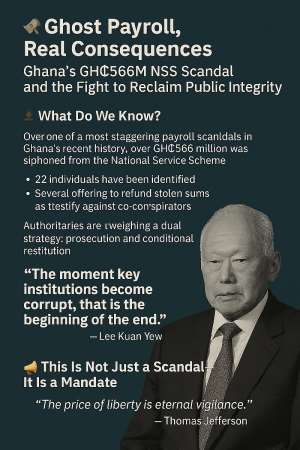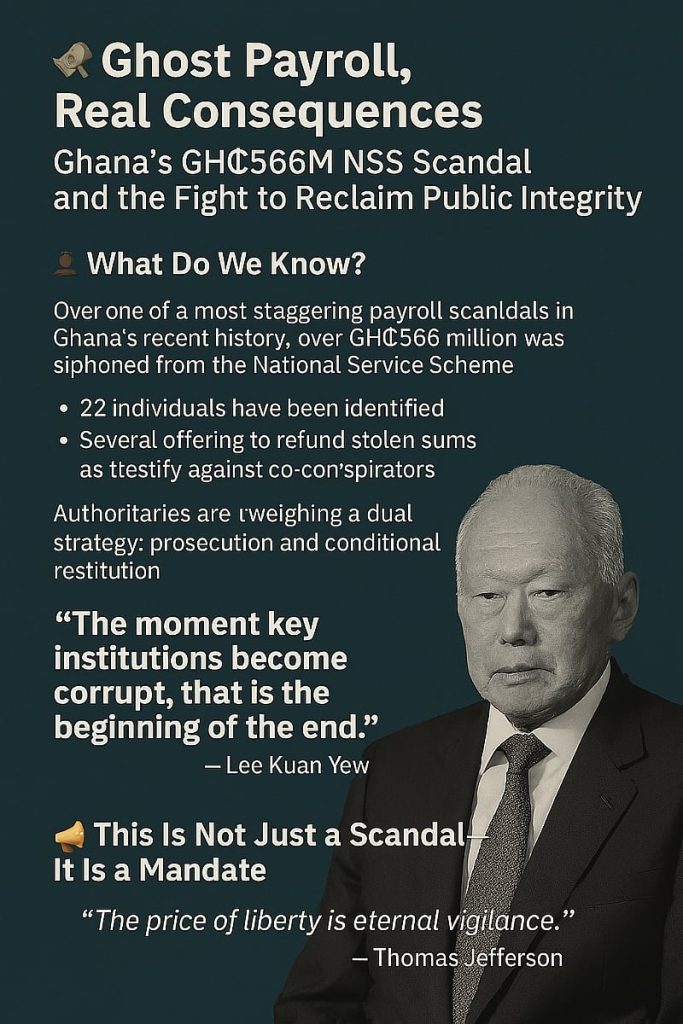
💸 In every democracy, there comes a reckoning—a moment when institutions are called to account not merely by law, but by the moral conscience of a nation. Ghana now faces such a moment.
The recent revelation that over GH¢566 million was stolen from the National Service Scheme (NSS) through ghost names has shaken the very foundation of public trust. More than 80,000 fictitious entries—names of non-existent personnel—were smuggled into the payroll during the 2023/24 service year, diverting state funds from critical development needs to private pockets.
It is a staggering breach. Yet, even more unsettling than the scale of theft is the suggestion that systemic loopholes allowed it to thrive.
🕵🏿 What Do We Know?
A formal investigation by the Attorney General’s Department has identified 22 individuals implicated in the scheme. Several of them have already offered to:
Refund stolen sums, and Testify against co-conspirators as part of plea bargaining arrangements
Authorities are now weighing a dual strategy: criminal prosecution for core offenders and conditional restitution for those who confess and cooperate.
“The moment key institutions become corrupt, that is the beginning of the end.” — Lee Kuan Yew
Ghana stands at that precipice. This is not merely about punishing wrongdoing. It is about saving the moral soul of public service.
🌍 Lessons from Global Experience
Other nations confronted by similar scandals have responded with clarity and consequence:
In Singapore, even mid-level public officers face swift jail terms under the Corrupt Practices Investigation Bureau (CPIB), which operates with fierce independence. No deal is offered unless public interest is demonstrably served. The United States, under the False Claims Act, incentivizes whistleblowers and imposes triple damages in public fraud cases. In 2021 alone, over $2 billion was recovered through fraud-related prosecutions. Canada and the UK combine biometric payroll systems, public audit trails, and real-time reporting dashboards to prevent recurrence.
These are not acts of performative governance—they are pillars of state resilience. Ghana must do no less.
🇬🇭 The True Cost of Corruption
This is not just about numbers on a ledger. The implications are tangible:
GH¢566 million could have trained 5,000 nurses or equipped dozens of rural clinics. It could have funded mobile diagnostic labs or kickstarted river restoration initiatives. It could have created thousands of decent jobs—real names, real futures.
“Corruption is paid by the poor.” — Pope Francis
When a nation normalizes refund over repentance and settlement over sentencing, it tells future fraudsters not to fear prison—only a payment plan.
🧭 The Civic Response: What Ghana Must Demand Now
1. Public Prosecution, Not Quiet Settlement
Plea deals must not shroud the truth. The public has a right to know who stole what, how, and with whose help.
2. Annual, Verifiable Asset Declarations
These should not gather dust in sealed envelopes but be independently audited and accessible.
3. Biometric Payroll Systems Across All Sectors
Real-time validation of workers prevents ghosting before it begins.
4. Whistleblower Protection and Incentives
Safe and anonymous reporting channels must be established and enforced by law.
5. Citizen Oversight through Digital Dashboards
The public should be able to track recruitment, deployment, and payments from local to national levels.
📣 This Is Not Just a Scandal—It Is a Mandate
The GH¢566 million theft is a test of whether Ghanaian democracy has the spine to clean its own house. Whether restitution without revelation will suffice—or whether citizens will insist that those who steal from the poor be named, tried, and punished in full daylight.
“The price of liberty is eternal vigilance.” — Thomas Jefferson
Let this be our moment—not of despair, but of defiant resolve.
Retired Senior Citizen
Teshie-Nungua
[email protected]


